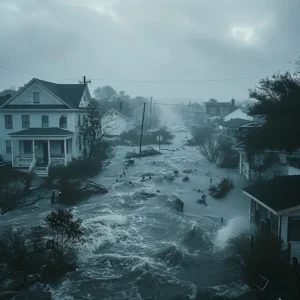
You’d think in a flooded city with no electricity, having your husband nearby would be a comfort. The past few days, however, have proven otherwise. As the hurricane approached, I was already feeling the weight of responsibility. I had prepared meticulously: stocked up on food and water, charged all the power banks, and downloaded cartoons for the kids. I was determined to ensure that our little ones, Lily and Ethan, would be as comfortable as possible during the storm.
Meanwhile, Brandon seemed indifferent. I had tried to engage him in securing the windows, but he shrugged off my concerns. “We’ll be fine,” he said, his eyes glued to the TV. I could feel the frustration building inside me as I realized that I couldn’t rely on him to take this seriously. The news had warned us of the storm’s severity, but Brandon’s casual attitude made me feel even more alone in preparing for what might be a significant crisis.
The wind started howling outside, and the lights flickered before going out completely. My initial attempts to keep things calm for the kids involved creating a makeshift adventure camp in the living room with their favorite snacks and cartoons. But as the storm raged on, my sense of control slipped away further. Brandon, who had retreated to the car to escape the heat, was nowhere to be found.

A flood in a residential area | Source: Midjourney
I had to manage everything on my own. The wind grew louder, and the house creaked under the pressure. Lily and Ethan were scared, and I tried to comfort them by reading stories and making the best of the situation with a fort built from blankets and pillows. Despite my efforts to keep the mood light, the strain was visible.
Then, I discovered that half of the snacks I had carefully rationed were gone. I confronted Brandon, who was using the power bank to play games on his phone. His dismissive response—that I was overreacting and that he was simply bored—added to my frustration. His behavior was not just a lack of practical help but also a profound disregard for the severity of the situation.
Things escalated when Brandon, unable to handle the heat or the stress, stormed out to sit in the car with the air conditioning running. This left me to juggle the emotional and logistical demands of the storm alone. The sense of betrayal and isolation was overwhelming. It felt as if I was facing two storms: one outside and one within my own home.
Just as I was trying to manage the situation and make the best of our limited resources, Derek, our neighbor, reached out. His offer of snacks and an extra power bank was a lifeline. When he arrived, it was a relief not only to have practical help but also to have someone else’s company. Derek’s presence offered a brief respite from the tension and a reminder that I wasn’t entirely alone.
Brandon’s return, filled with anger at the sight of Derek helping us, was another blow. His reaction to the situation further emphasized the chasm that had grown between us. Derek’s firm stance on the need for Brandon to step up highlighted the seriousness of the issue, but it also put additional strain on the already tense atmosphere.
The hurricane passed, and as the power came back on, I felt a mix of relief and reflection. Brandon’s silence upon his return and the heavy atmosphere in the house spoke volumes. The storm had exposed underlying issues in our relationship, and dealing with the immediate aftermath provided a chance to reflect on what changes might be necessary.
Looking back, the hurricane was more than a natural disaster; it was a catalyst that brought underlying problems to the forefront. Navigating through the physical and emotional challenges of the storm has left me contemplating the future and how best to address the issues that have been revealed.
Leave a Reply